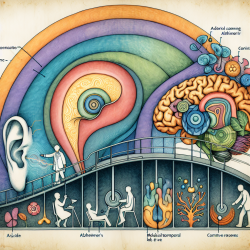Academic Professional: Enhancing Online Therapy with Knowledge-Infused Summarization

In the realm of online therapy, especially within educational settings, the ability to distill essential information from clinical diagnostic interviews is paramount. The study titled "Knowledge-Infused Abstractive Summarization of Clinical Diagnostic Interviews: Framework Development Study" by Torous et al. offers a data-driven approach that could revolutionize how practitioners summarize and interpret patient interactions. This blog post explores how the findings of this study can enhance the skills of practitioners and encourage further research.
Introduction
Online therapy services, such as those provided by TinyEYE, are increasingly integral to school-based mental health support. A significant challenge in this field is the effective summarization of clinical diagnostic interviews, which are often lengthy and contain nuanced information critical for accurate diagnosis and treatment planning.
Key Findings from the Study
The study proposes an unsupervised, knowledge-infused abstractive summarization (KiAS) approach. This method leverages domain knowledge from the Patient Health Questionnaire-9 (PHQ-9) to generate summaries that are both informative and concise. The KiAS approach was evaluated using the Distress Analysis Interview Corpus-Wizard of Oz (DAIC-WoZ) dataset and demonstrated significant improvements over traditional summarization methods.
Methodology
The researchers incorporated domain-specific knowledge into an integer linear programming framework to optimize the linguistic quality and informativeness of summaries. They compared KiAS with three baseline approaches:
- Extractive summarization using the SumBasic algorithm
- Abstractive summarization without knowledge infusion
- Abstraction over extractive summarization
Results
The KiAS approach produced summaries that were significantly more informative and easier to read than those generated by the baseline methods. Specifically, KiAS improved thematic overlap by 23.3%, Flesch Reading Ease by 4.4%, contextual similarity by 2.5%, and Jensen Shannon divergence by 2.2%. These improvements highlight the potential of knowledge-infused summarization in enhancing the utility of clinical diagnostic interviews.
Implications for Practitioners
Practitioners can harness the power of KiAS to:
- Reduce the time spent on summarizing lengthy interviews
- Improve the accuracy of diagnoses by focusing on the most relevant information
- Enhance follow-up sessions with patients through better-informed decision-making
By integrating KiAS into their workflow, practitioners can provide more effective and efficient mental health support to children.
Encouraging Further Research
The promising results of the KiAS approach underscore the need for further research in this area. Practitioners are encouraged to explore and contribute to the development of knowledge-infused summarization techniques. Collaborative efforts between clinicians and researchers can lead to even more refined and effective tools for summarizing clinical diagnostic interviews.
Conclusion
The integration of knowledge-infused summarization methods, such as KiAS, into online therapy services can significantly enhance the outcomes for children receiving mental health support. By leveraging domain-specific knowledge, practitioners can make more informed decisions and provide better care.To read the original research paper, please follow this link:
Knowledge-Infused Abstractive Summarization of Clinical Diagnostic Interviews: Framework Development Study.
Citation: Torous, J., Baldwin, T., Poddar, A., Manas, G., Aribandi, V., Kursuncu, U., Alambo, A., Shalin, V. L., Thirunarayan, K., Beich, J., Narasimhan, M., & Sheth, A. (2021). Knowledge-infused abstractive summarization of clinical diagnostic interviews: Framework development study. JMIR Mental Health, 8(5), e20865. https://doi.org/10.2196/20865










